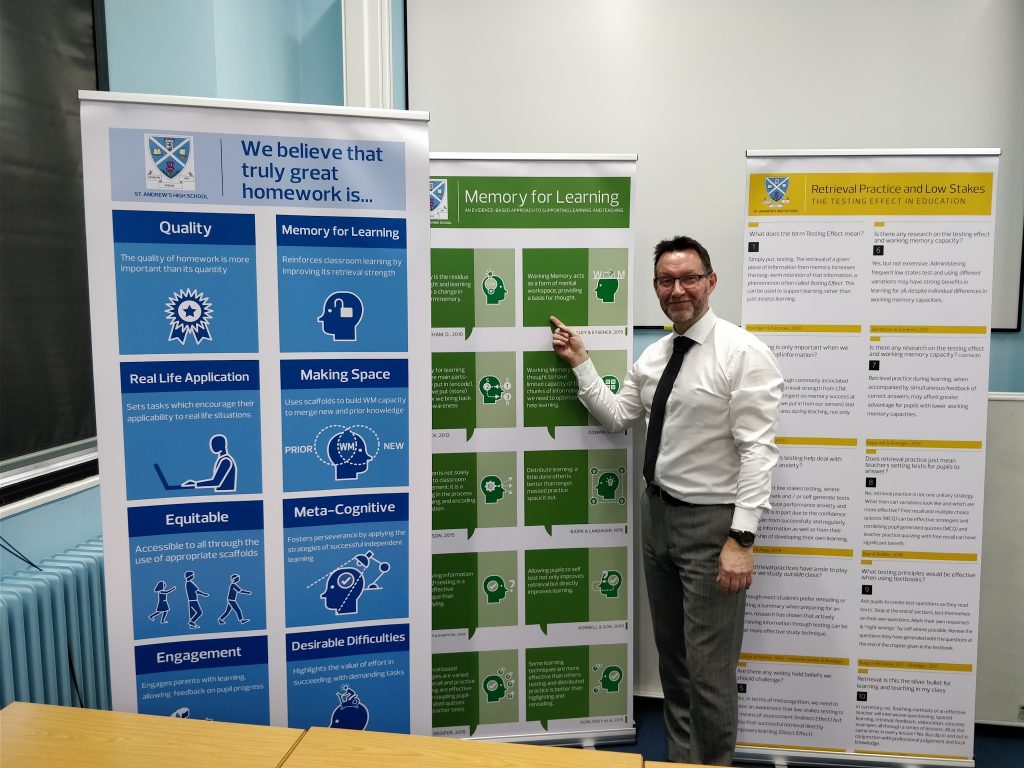In March, Mark Healy gave a thought-provoking talk by outlining his perspective of the current educational system and ways teachers and lecturers can start improving their own instruction practice by using evidence-informed strategies. But, hold on, Mark raised three main aspects that need to be taken into consideration before diving into evidence-informed practice.

First point:
What evidence should teachers be using and basing their teaching on? There are many (too many) voices out there suggesting the next new thing in education. How can teachers trust was to use and what to stay away from? Mark explained that for teachers it is difficult to separate effective strategies from ineffective ones. They do not have the knowledge to identify the effective strategies nor the time to obtain this knowledge in order to make an informed decision. Thus, they need resources that provide them with the necessary know-how in order to make a decision. These resources need to be written in a way that clearly explains a teaching strategy (without jargon) and provides step-by-step guidelines on how to apply them in the classroom.
Thus, if we want to start an educational system that is evidence-informed – and by evidence we mean based on rigour research in the learning sciences – we need to translate findings from research papers into guidelines that educators can understand and use. One scholarly outreach project that is doing this is The Learning Scientists. They publish weekly blog posts that summarises research findings for teachers and students to use. Furthermore, they offer free resources such as presentation slides, posters, bookmarks, and videos explaining the most successful learning strategies that research has revealed.
Second point:
So, let’s say we have provided teachers with the resources and now individual teachers start implementing these evidence-informed strategies in their classrooms. What will be the success rate of this? According to Mark it will be relatively low, but why? He argues that the entire educational institution needs to stand behind and subscribe to this evidence-informed approach and provide teachers with time to actually learn about the strategies and provide room for discussions between teachers (task forces). He further explained that in his school there was a 6 months preparation with multiple groups of teachers to introduce evidence-informed strategies properly. Teachers were given time and space to develop teaching strategies that were based on research. First step, was to identify a core task force group of teachers who engaged in reading of the research papers in order to obtain a clear understanding of them. Afterwards, the outcome of these readings and discussions were communicated to all other teachers. Only as a last step, concrete implementations were created and introduced as a general intervention.
Another crucial point here is: Don’t try to implement all strategies there are at once, but rather start with one strategy or max. two per academic year. You will have your hands full applying them properly. This takes us to the third point.
Third point:
The third and final point that I found important in Mark’s talk was that educators need to be aware that problems and issues in education don’t have a quick fix. Changes and implementation of effective strategies do take time – if the goal is to do this sustainably. Thus, strategies that promise to be a quick fix of general problems in education, should set off alarms because they probably are a fad or they are not communicated correctly.
In my view, this point is quite similar to learning strategies on an individual level: Whenever a study strategy seems completely effortless (e.g., highlighting, summarising, copying notes from one format into another), it will probably not result in long-lasting knowledge. On the contrary, when a study strategy feels effortful and hard work, it is very likely helping you to process and store knowledge in a deeper way that increases the likelihood of longer-lasting knowledge retention in the future.
Here are additional resources of the talk for you:
Video of the talk
Slides of the talk
Please feel free to comment below if you have additional thoughts!


I think one of the most difficult things is separating fad from effective intervention. Thereare many fads, promulgated by well meaning (or even not so well meaning) people, whichare just ineffective.
I work in health care, and the way to get a new drug is that it has to be a significant improvement on current best practice. Sometimes i think in education we say things like “this is so much better than a 3-hour lecture to 300 people” therefore it must be good.
All that says is that is it isn’t bad, not that it is good.
It is finding the good that is hard. Or even finding what works better than a placebo..
I agree. A close look at the evidence can help to decide if a new strategy is worthwhile implementing. Also, discussing with people in the research field is a good option. There are, for example, many scientists (including myself) on Twitter and open for questions and discussions. Another option is to invite experts in to give a talk or CPD workshop.